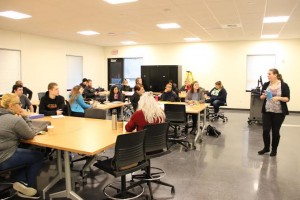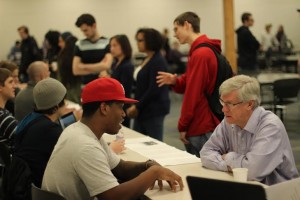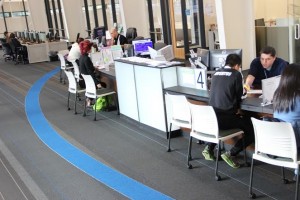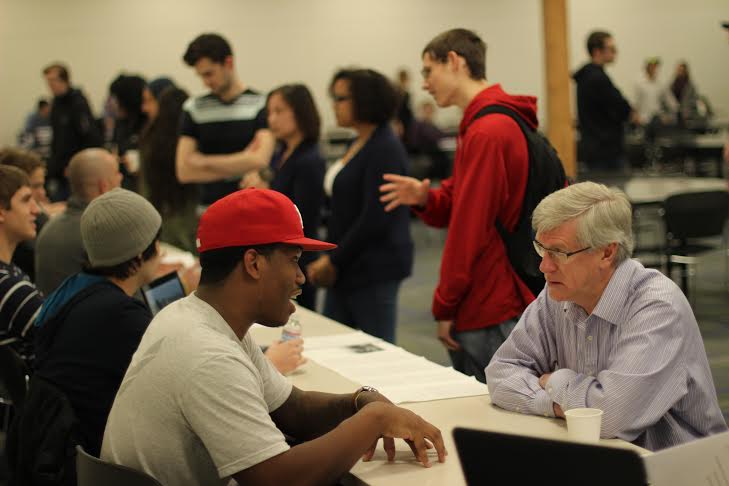Good news for South Sound residents: one of the best community colleges in the country is right in our backyard.
Every two years, the Aspen Institute recognizes community colleges around the country for exceptional student outcomes in four areas. In January, South Puget Sound Community College learned that it was one of 150 schools now eligible to receive the $1 million Aspen Prize, which will be awarded in 2017.

“It’s an honor and a privilege because there are 1,200 schools that can participate in this competition,” says SPSCC’s Vice President of Instruction Michelle Andreas. “Once they select the top 150, we submit information and they come on campus. There’s an extensive process to determine those that are selected.”
The Aspen Institute looks at student outcomes in the areas of student learning, certificate and degree completion, employment and earnings, and access and success for minority and low-income students.
On the student instructional front, Andreas says the staff and faculty have been doing extensive work on developing instructional pathways for students. “Pathways are linked to career clusters all the way from basic skills to college credit,” she says. “Research is showing that if you can get students to 45 college credits they are much more likely to finish the degree. When we can contextualize our general education classes such as English 101, the subjects make much more sense to students and they’re much more likely to move on.”
Within the pathways, core subjects like math and English are integrated with business, environmental science, and sociology. Regardless of their literacy level, any student can begin a pathway with the option of switching to a different one later. Each pathway lasts for three quarters.
The approach has proven highly effective. In Washington State, the educational model for community colleges is based on student achievement points, which are based on factors like how quickly basic education students are able to transfer to college level courses, move through developmental work, gain credits, and move toward graduation. “We were recently notified that we are in the top tier as far as achievement points for our students,” says Dave Pelkey, Vice President of Student Services.

In fact, SPSCC led the state in gains in student achievement points for the 2014-2015 school year. “We improved in virtually every area, even when our enrollment went down seven points,” says Andreas. “We had huge gains in basic skills and college readiness.” In particular, students gained 15% in student achievement points in math. “Our math faculty has been working a lot on innovation,” she says. “Math is the greatest gatekeeper in terms of students moving on. They’ve done a lot of work revising their curriculum.”
Andreas says that the Basic Education faculty has led the way when it comes to contextualizing classes. “They found that especially students with lower literacy levels learn better when they have real life examples,” she says. “The knowledge is not just theoretical and abstract.”
Over the past few years, the faculty have begun to implement ‘universal design,’ a framework for improving and optimizing teaching and learning. “Our Basic Skills instructors are very grounded in universal design, and the principles have been woven into pathways,” says Andreas. “For the rest of our faculty, we’ve just really started to immerse them in it. It’s an effort that we will continue intensively over the next three to five years.”
In the area of employment and earnings, Pelkey says the college has worked to put together programs that reflect the employment needs of the community. “We want to make sure that our students continue to be employable within the community we serve,” he says. “We’re consistently looking at our programs to evaluate and see where we need to make modifications.”

There have also been concerted efforts to remove barriers for low income students and students of color. “We’ve created different outreach strategies to target sub-communities in our area so that students can see what college could be for them,” he says. The college used a Title III grant, focused on student success, to explore how to best support students holistically during the first year. “We’re looking at ways to simplify and streamline bringing them in, including our advising model, admissions process, and our diversity and equity center that does a lot of work with students of color,” says Pelkey.
Beyond the individual recognition, SPSCC’s success is creating benefits for other colleges throughout the state. Washington operates on a federation system of 34 community and technical colleges. Presidents meet monthly, vice presidents meet quarterly, and the schools share information on challenges they experience and solutions they discover. “It mirrors the college structure,” says Andreas. “We talk about what we’re struggling with and what we’ve found that works.”
Aside from the prestige, she says the Aspen Institute’s recognition “gives honor to the hard work that our faculty and staff have been engaged in for a number of years. It’s their heart and soul.” Beyond that, she says, “I hope that our community as a whole feels really proud that their community college is looked at as one of the greatest in the nation.”
For more information about South Puget Sound Community College, visit www.spscc.edu or call 360-596-5200.
Sponsored




















































